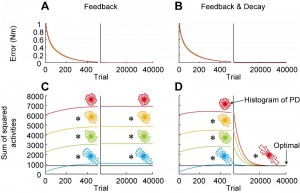The surprising power of forgetting A theoretical proof that slight forgetting perfects motor learning


Results of simulations using 1,000 neurons. © Masaya Hirashima and Daichi Nozaki
Trial-dependent changes in the magnitude of error (A, B) and the sum of squared neural activities (C, D). When there was no forgetting, although motor error decreased (A), the activity level did not reach the optimal state (C). In contrast, when there was slight forgetting, after motor error decreased (B), the activity level consistently reached the optimal state regardless of the initial state (D). The histogram showing the activation pattern of all neurons also converges at the optimal state, reproducing the pattern observed in neural-recording experiments.
Forgetting is generally considered an inconvenient aspect of motor learning. However, Assistant Professor Masaya Hirashima and Professor Daichi Nozaki at the University of Tokyo’s Graduate School of Education have shown that “slight” forgetting in the motor learning process can theoretically optimize neural command for movement control. The researchers developed a computer simulation of a neuromuscular network model in which synaptic weights spontaneously experience slow decay. Using this simulation, they demonstrated that the model could reproduce the reported stereotypical activity patterns of muscles and motor cortex neurons in various primate motor tasks that are considered as the consequence of motor effort optimization. These results support the hypothesis that slight forgetting plays a crucial role in the optimization process of the redundant motor system.
How this optimization is implemented in the brain remains unknown, but this study importantly provides a biologically plausible hypothesis by demonstrating that the innate function of forgetting can contribute to optimization. A deeper understanding of the effect of forgetting could lead to the development of more effective training schedules in the fields of sports and rehabilitation.
Press release (Japanese)Paper
Masaya Hirashima, Daichi Nozaki,
“Learning with slight forgetting optimizes sensorimotor transformation in redundant motor systems,”
PLoS Computational Biology Online Edition: 2012/6/29 (Japan time), doi: 10.1371/journal.pcbi.1002590.
Article link
Links
Division of Physical and Health Education (Japanese)






